名词性从句
什么叫名词性从句
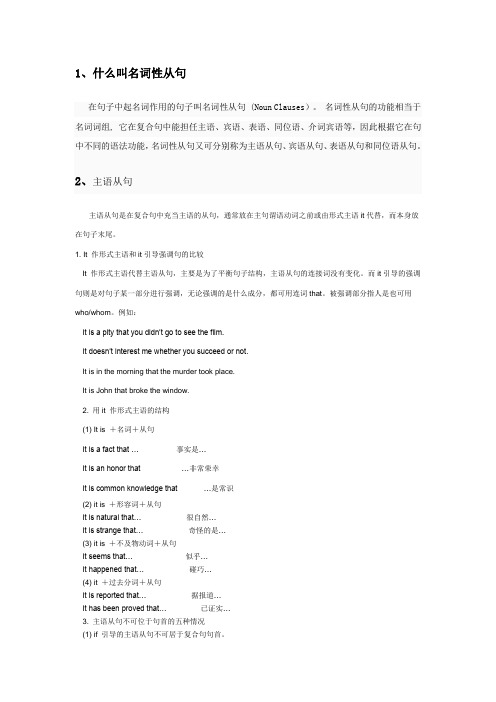
1、什么叫名词性从句在句子中起名词作用的句子叫名词性从句 (Noun Clauses)。
名词性从句的功能相当于名词词组, 它在复合句中能担任主语、宾语、表语、同位语、介词宾语等,因此根据它在句中不同的语法功能,名词性从句又可分别称为主语从句、宾语从句、表语从句和同位语从句。
2、主语从句主语从句是在复合句中充当主语的从句,通常放在主句谓语动词之前或由形式主语it代替,而本身放在句子末尾。
1. It 作形式主语和it引导强调句的比较It 作形式主语代替主语从句,主要是为了平衡句子结构,主语从句的连接词没有变化。
而it引导的强调句则是对句子某一部分进行强调,无论强调的是什么成分,都可用连词that。
被强调部分指人是也可用who/whom。
例如:It is a pity that you didn’t go to see the film.It doesn’t interest me whether you succeed or not.It is in the morning that the murder took place.It is John that broke the window.2. 用it 作形式主语的结构(1) It is +名词+从句It is a fact that … 事实是…It is an honor that …非常荣幸It is common knowledge that …是常识(2) it is +形容词+从句It is natural that… 很自然…It is strange that… 奇怪的是…(3) it is +不及物动词+从句It seems that… 似乎…It happened that… 碰巧…(4) it +过去分词+从句It is reported that… 据报道…It has been proved that… 已证实…3. 主语从句不可位于句首的五种情况(1) if 引导的主语从句不可居于复合句句首。
名词性从句
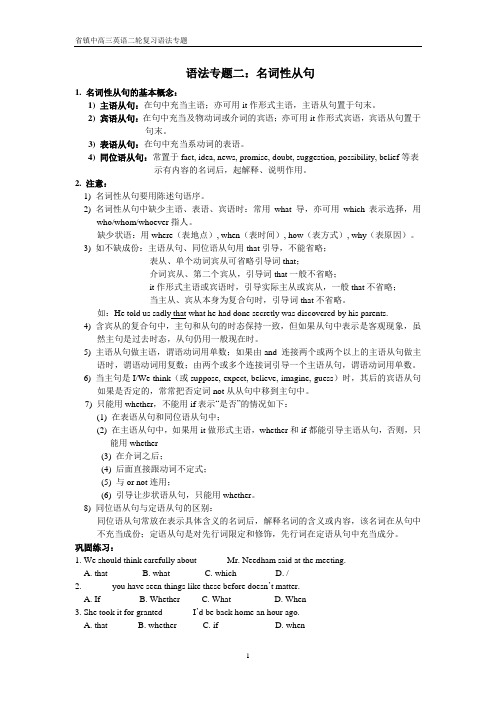
语法专题二:名词性从句1. 名词性从句的基本概念:1) 主语从句:在句中充当主语;亦可用it作形式主语,主语从句置于句末。
2) 宾语从句:在句中充当及物动词或介词的宾语;亦可用it作形式宾语,宾语从句置于句末。
3) 表语从句:在句中充当系动词的表语。
4) 同位语从句:常置于fact, idea, news, promise, doubt, suggestion, possibility, belief等表示有内容的名词后,起解释、说明作用。
2. 注意:1) 名词性从句要用陈述句语序。
2) 名词性从句中缺少主语、表语、宾语时:常用what 导,亦可用which表示选择,用who/whom/whoever指人。
缺少状语:用where(表地点), when(表时间), how(表方式), why(表原因)。
3) 如不缺成份:主语从句、同位语从句用that引导,不能省略;表从、单个动词宾从可省略引导词that;介词宾从、第二个宾从,引导词that一般不省略;it作形式主语或宾语时,引导实际主从或宾从,一般that不省略;当主从、宾从本身为复合句时,引导词that不省略。
如:He told us sadly that what he had done secretly was discovered by his parents.4) 含宾从的复合句中,主句和从句的时态保持一致,但如果从句中表示是客观现象,虽然主句是过去时态,从句仍用一般现在时。
5) 主语从句做主语,谓语动词用单数;如果由and 连接两个或两个以上的主语从句做主语时,谓语动词用复数;由两个或多个连接词引导一个主语从句,谓语动词用单数。
6) 当主句是I/We think(或suppose, expect, believe, imagine, guess)时,其后的宾语从句如果是否定的,常常把否定词not从从句中移到主句中。
7) 只能用whether,不能用if表示“是否”的情况如下:(1) 在表语从句和同位语从句中;(2) 在主语从句中,如果用it做形式主语,whether和if都能引导主语从句,否则,只能用whether(3) 在介词之后;(4) 后面直接跟动词不定式;(5) 与or not连用;(6) 引导让步状语从句,只能用whether。
名词性从句

语序:陈述语序
在句中充当主语的从句称为主语 从句。英语中主语从句的句型可分 为两大类: 直接将主语从句放在主语位置上; 用it作形式主语,将真正的主语从 句后移,放在其他成分后。
让我们先说说第一类吧!
一、连接词(只起连接作用,在从句中不充当句子成分)
that:无词义。 e.g.: 他赢得比赛一事在我国引起巨大轰动。 That he won the game made a tremendous stir in our country. whether:“是否”。可单独使用,也可与or或or not连用。 e.g.: 我们明天是否能去春游取决于天气。 Whether we can go for a spring outing depends on the weather. 他们是否会来还未告诉我们。 Whether they will come has not been told to us.
四、主语从句与主谓一致
一个从句作主语时,谓语动词通常用单数形式, 特别是用it作形式主语的句型。 e.g.: Whether this kind of chemicals is better has not been tried.
当what引导主从,应遵循意义一致原则,谓语动 词选用相应形式。表语是复数时,谓语动词用复数 形式。 e.g.: What we do willingly is easy. What they were searching for were the missing gems.
Introduction
名词性从句:包括四种:主语从句、表语从句、宾语从
句、同位语从句。
连词:引导名词性从句的连词有以下三类
连接词:只起连接作用,在从句中不充当句子成分; 连接代词:连接主从句,并在从句中作主语/宾语/表 语/定语; 连接副词:连接主从句,并在从句中作时状/地状/原 因状/方式状。
名词性从句
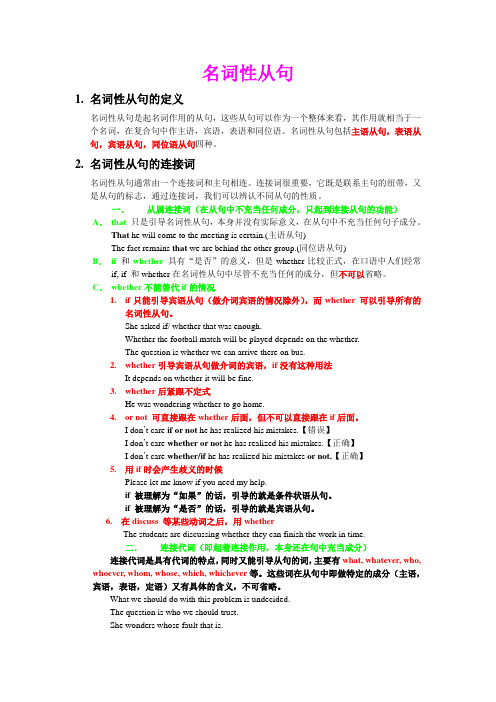
名词性从句1.名词性从句的定义名词性从句是起名词作用的从句,这些从句可以作为一个整体来看,其作用就相当于一个名词,在复合句中作主语,宾语,表语和同位语。
名词性从句包括主语从句,表语从句,宾语从句,同位语从句四种。
2.名词性从句的连接词名词性从句通常由一个连接词和主句相连。
连接词很重要,它既是联系主句的纽带,又是从句的标志,通过连接词,我们可以辨认不同从句的性质。
一.从属连接词(在从句中不充当任何成分,只起到连接从句的功能)A.that 只是引导名词性从句,本身并没有实际意义,在从句中不充当任何句子成分。
That he will come to the meeting is certain.(主语从句)The fact remains that we are behind the other group.(同位语从句)B.if和whether具有“是否”的意义,但是whether比较正式,在口语中人们经常if, if 和whether在名词性从句中尽管不充当任何的成分,但不可以省略。
C.whether不能替代if的情况1.if只能引导宾语从句(做介词宾语的情况除外),而whether 可以引导所有的名词性从句。
She asked if/ whether that was enough.Whether the football match will be played depends on the whether.The question is whether we can arrive there on bus.2.whether引导宾语从句做介词的宾语,if没有这种用法It depends on whether it will be fine.3.whether后紧跟不定式He was wondering whether to go home.4.or not 可直接跟在whether后面,但不可以直接跟在if后面。
名词性从句的三种类型及例句解析
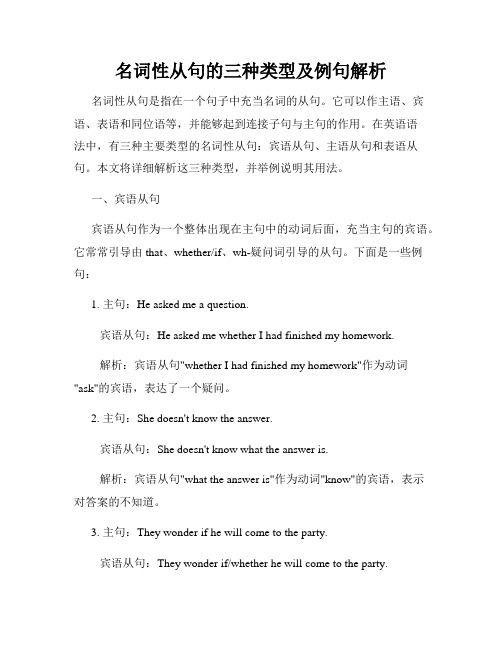
名词性从句的三种类型及例句解析名词性从句是指在一个句子中充当名词的从句。
它可以作主语、宾语、表语和同位语等,并能够起到连接子句与主句的作用。
在英语语法中,有三种主要类型的名词性从句:宾语从句、主语从句和表语从句。
本文将详细解析这三种类型,并举例说明其用法。
一、宾语从句宾语从句作为一个整体出现在主句中的动词后面,充当主句的宾语。
它常常引导由that、whether/if、wh-疑问词引导的从句。
下面是一些例句:1. 主句:He asked me a question.宾语从句:He asked me whether I had finished my homework.解析:宾语从句"whether I had finished my homework"作为动词"ask"的宾语,表达了一个疑问。
2. 主句:She doesn't know the answer.宾语从句:She doesn't know what the answer is.解析:宾语从句"what the answer is"作为动词"know"的宾语,表示对答案的不知道。
3. 主句:They wonder if he will come to the party.宾语从句:They wonder if/whether he will come to the party.解析:宾语从句"if/whether he will come to the party"作为动词"wonder"的宾语,表达了对他是否会来参加派对的疑问。
二、主语从句主语从句作为一个整体出现在句子的最前面,充当主句的主语。
它通常由that引导,也可以由wh-疑问词引导。
以下是一些例句:1. 主句:It is important to learn a foreign language.主语从句:That she is a hardworking student is important.解析:主语从句"That she is a hardworking student"作为句子的主语,强调了她是一个勤奋的学生的重要性。
名词性从句
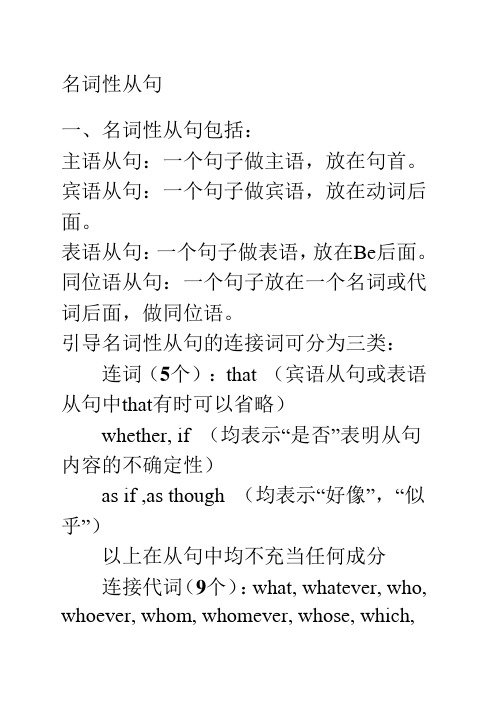
名词性从句一、名词性从句包括:主语从句:一个句子做主语,放在句首。
宾语从句:一个句子做宾语,放在动词后面。
表语从句:一个句子做表语,放在Be后面。
同位语从句:一个句子放在一个名词或代词后面,做同位语。
引导名词性从句的连接词可分为三类:连词(5个):that (宾语从句或表语从句中that有时可以省略)whether, if (均表示“是否”表明从句内容的不确定性)as if ,as though (均表示“好像”,“似乎”)以上在从句中均不充当任何成分连接代词(9个):what, whatever, who, whoever, whom, whomever, whose, which,whichever连接副词(7个):when, where, how, why, whenever, wherever, however二、连词that需要注意的用法:1、(难点)不及物动词加介词再加宾语的用法,在宾语从句中要省略介词。
比如:He boasted of his success. (boast of + 宾语)He boasted that he was a success. (boast of+宾语从句,省略介词of)但是,有些固定结构中能用介词+that的用法;包括besides/beyond that(这两个都表示除---外), but that(要不是;若非), except that(除去), in that(因为), save that(除---外)的用法:①、She knew nothing besides/beyond that he was there.②、He didn’t really know what he was going to say beyond that the situation demanded something romatic.③、Noting would please him but that we goalong.④、I know nothing except that he left home early that morning.⑤、I prefer his plan to yours in that I think it’s more practical.⑥、I am well save that I have a cold.2、宾语从句中that有时省;有时不能省略:①、当that和主句谓语之间或者从句之间有插入语时,that不能省略:He judged that, because he was a child, he didn’t know wine.②、当that从句和另一名词性从句并列做宾语时,that不能省略:Everyone knows what happened and that he was worried.③、当that从句是双宾语中的直接宾语时,that一般不省略。
名词性从句
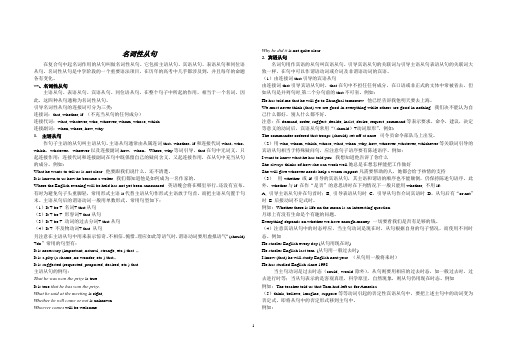
名词性从句在复合句中起名词作用的从句叫做名词性从句。
它包括主语从句、宾语从句、表语从句和同位语从句。
名词性从句是中学阶段的一个重要语法项目,在历年的高考中几乎都涉及到,并且每年的命题各有变化。
一、名词性从句主语从句、表语从句、宾语从句、同位语从句,在整个句子中所起的作用,相当于一个名词。
因此,这四种从句通称为名词性从句。
引导名词性从句的连接词可分为三类:连接词:that, whether, if (不充当从句的任何成分)连接代词:what, whatever, who, whoever, whom, whose, which.连接副词:when, where, how, why1.主语从句作句子主语的从句叫主语从句。
主语从句通常由从属连词that,whether,if和连接代词what,who,which,whatever,whoever以及连接副词how,when,Where, why等词引导。
that在句中无词义,只起连接作用;连接代词和连接副词在句中既保留自己的疑问含义、又起连接作用,在从句中充当从句的成分。
例如:What he wants to tell us is not clear. 他要跟我们说什么,还不清楚。
It is known to us how he became a writer. 我们都知道他是如何成为一名作家的。
Where the English evening will be held has not yet been announced. 英语晚会将在哪里举行,还没有宣布。
有时为避免句子头重脚轻,常用形式主语it代替主语从句作形式主语放于句首,而把主语从句置于句末。
主语从句后的谓语动词一般用单数形式。
常用句型如下:(1)It + be + 名词+ that从句(2)It + be + 形容词+ that从句(3)It + be + 动词的过去分词+ that从句(4)It + 不及物动词+ that 从句另注意在主语从句中用来表示惊奇、不相信、惋惜、理应如此等语气时,谓语动词要用虚拟语气“(should) +do”常用的句型有:It is necessary (important, natural, strange, etc.) that …It is a pity (a shame, no wonder, etc.) that…It is suggested (requested, proposed, desired, etc.) that主语从句的例句:That he was won the prize is true.It is true that he has won the prize.What he said at the meeting is right,Whether he will come or not is unknown.Whoever comes will be welcome. Why he did it is not quite clear.2. 宾语从句名词句用作宾语的从句叫宾语从句。
名词性从句
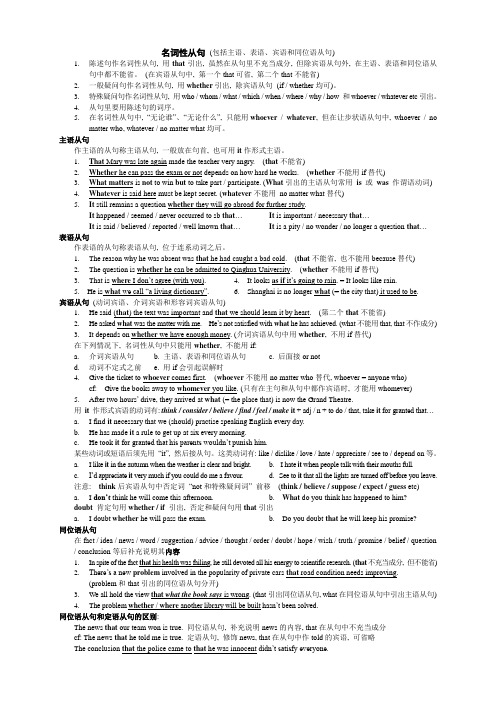
名词性从句(包括主语、表语、宾语和同位语从句)1.陈述句作名词性从句, 用that引出, 虽然在从句里不充当成分, 但除宾语从句外, 在主语、表语和同位语从句中都不能省。
(在宾语从句中, 第一个that可省, 第二个that不能省)2.一般疑问句作名词性从句, 用whether引出, 除宾语从句(if / whether均可)。
3.特殊疑问句作名词性从句, 用who / whom / what / which / when / where / why / how 和whoever / whatever etc引出。
4.从句里要用陈述句的词序。
5.在名词性从句中, “无论谁”、“无论什么”, 只能用whoever/ whatever, 但在让步状语从句中, whoever / nomatter who, whatever / no matter what均可。
主语从句作主语的从句称主语从句, 一般放在句首, 也可用it作形式主语。
1.That Mary was late again made the teacher very angry. (that不能省)2.Whether he can pass the exam or not depends on how hard he works. (whether不能用if替代)3.What matters is not to win but to take part / participate. (What引出的主语从句常用is或was作谓语动词)4.Whatever is said here must be kept secret. (whatever不能用no matter what替代)5.It still remains a question whether they will go abroad for further study.It happened / seemed / never occurred to sb that…It is important / necessary that…It is said / believed / reported / well known that…It is a pity / no wonder / no longer a question that…表语从句作表语的从句称表语从句, 位于连系动词之后。
- 1、下载文档前请自行甄别文档内容的完整性,平台不提供额外的编辑、内容补充、找答案等附加服务。
- 2、"仅部分预览"的文档,不可在线预览部分如存在完整性等问题,可反馈申请退款(可完整预览的文档不适用该条件!)。
- 3、如文档侵犯您的权益,请联系客服反馈,我们会尽快为您处理(人工客服工作时间:9:00-18:30)。
名词性从句在句子中起名词作用的各种从句,统称为名词性从句。
根据它们在句中所起的语法作用,这类从句分别称为主语从句、1.作动词的宾语①大部分宾语从句直接跟在动词后:He doesn’t know where the post office is. 他不知道邮局在哪里。
②有些宾语从句前要有间接宾语:He told me what I should read. 他已告诉我应该读些什么。
③如果宾语从句后面有宾语补足语,要使用形式宾语it,而将从句放到补足语后面:I thought it strange that he failed to call me.④在think, believe, suppose, expect等动词之后的宾语从句中,如果从句谓语是否定含义,则不用否定形式,而将主句谓语动词think等变为否定形式:I don’t think you are right.*⑤在think, believe, imagine, suppose, guess, hope 等动词以及I’m afraid等后,可用so代替一个肯定的宾语从句,还可用not代替一个否定的宾语从句:E.g. --- Do you believe it will clear up? 你以为天气会转晴吗?--- I believe so. 我认为会这样。
(--- I don’t believe so./I believe not.) 我认为不会这样。
-Do you think it’s going to rain over the weekend?-.A.I don’t believe B.I don’t believe itC.I believe not so D.I believe not-Don’t you think Jack’s health has been ruined by over drinking?-Yes, he told me himself.A.the thing B.it C.so D.the fact2. 作介词的宾语①that引导的宾语从句只有在except, in, but, besides等少数介词后偶尔可能用到:Your article is all right except that it is too long.你的文章挺好,只是太长了。
Did she say anything about how we should do the work?关于这工作我们该怎么做她说什么没有?*②有时在介词和其宾语从句的中间加形式宾语it;如短语动词answer for(担保)、count on (期待)、depend on、insist on、see to(负责,确保)等后接that引导的宾语从句时,必须冠以形式宾语it。
I’ll see to it that everything is ready. 我将负责把一切准备好。
③介词后的宾语从句不能由if引导,而要用whether.I’m counting on it that you will come.我期待着你的到来。
She’ll see to it that he goes ahead.她将确保他继续进行。
3. 作形容词的宾语在某些形容词(如afra id“恐怕”,sure“确信”,certain“肯定”,confident“相信”等)作表语时,可接一个that引导的宾语从句(也有人认为是状语从句):I’m afraid (that) I have made a mistake.恐怕我犯了一个错误。
表语从句表语从句放在连系动词(如be, seem, remain等)后:The question is whether we should accept their invitation.问题是我们是否应该接受他们的邀请。
1.when, where, why, because, how 等引导的从句作This is 和That is 的表语时,表示具体的时间、地点、原因、方式等:This is why we put off the meeting. 这就是我们推迟会议的原因。
This is why…=>This is the reason why…This is where…=>This is the place where…This is when…=>This is the time when…This is how…=>Thi s is the way(that/in which)…2.主语是reason时,表语从句常用that, 不用because;The reason for his absence was that he was ill。
他缺席的原因是病了。
3.as, as if, because 有时也可引导表语从句;Things were not as they seemed to be.情况并不是看上去的那个样子。
It looks as if it is (或:were) going to rain.看起来天要下雨。
▲注意:as if引导的表语从句有时也可用虚拟语气,表示可能性小。
主语从句主语从句在复合句中作句子的主语。
引导主语从句的词有连词that, whether, 连接代词who, what which; 连接副词when, where, how, why等。
如:1) What is needed for the space trip is careful preparation.2) Whether wild life can be well protected is of great importance.3) Who will go makes no difference.1.主语从句可以直接放在句首;也可用it作形式主语,而将从句放在句末。
如:That light travels in straight lines in known to all.It’s known to all that light travels in straight lines.众所周知,光沿直线运行。
When we shall have our sports meet is still a question.It is still a question when we shall have our sports meet. 我们什么时候开运动会仍然是个问题。
*注意:由that 引导的主语从句大多数要放到句末去。
由what …(所…的东西)引导的主语从句一般不用it 作形式主 语的结构:误:It is a book what he wants.正:What he wants is a book. 他要的东西是一本书。
由whether 及其它连词引导的主语从句放在句首或句子后部皆可。
由带主语从句的句子是疑问式,则须用it 作形式主语结构。
如:Has it been announced when the planes are to take off?飞机什么时候起飞宣布了没有?2.常见的用it 作形式主语的复合句结构: ①It is +名词+that 从句It is a fact (a shame, a pity, no wonder, good news …) ②It is +形容词+that 从句It is necessary (strange, important, wonderful, possible, likely,…) that … 这类主语从句中,谓语动词多数为“(should )+动词原形” ③It is +过去分词+that 从句It is said (reported, decided, …) that …④It +不及物动词+that 从句:It seems (happened, doesn’t matter, has turned out,…) that … △主语从句的连词that 虽不作成分,但亦不省略。
△whether 引导主语从句时,不用if 。
△单个从句作主语时,谓语动词用单数。
同 位 语 从 句在主从复合句中,用作同位语的从句,叫同位语从句。
它一般跟在某些名词(如fact, idea, news, promise, hope, order, doubt, bet 等)的后面;用以说明或解释前面的名词,引导同位语从句的词有连词that, whether, 连接副词how, when, where, why 等。
如:1)We were very excited at the news that our team had won.2)The fact that women can work as well as men is clear.3)Henry Adams made a promise that he would not open it until 2 o’clock. 4)I have no idea when Chaplin’s film will be on again. △同位语从句的连词不可省略。
△同位语从句与其前面的名词之间是同位关系, 这一名词在从句中不充当任何成分。
△同位语从句有时被别的词把它和名词隔开。
如:The story goes that he killed the cruel king with an arrow.同位语从句和定语从句的区别①从意义上讲,前者对名词加以补充说明,后者对名词进行修饰和限定。
②从结构上讲,前者由连接词引导,后者由关系词引导。
③从内涵上讲,前者所说明的名词与从句没有逻辑关系,后者所限定的名词是其逻辑上的主语、宾语、表语、定语、状语等。
The news that they won the match is true. 他们比赛获胜的消息是真的。
[同位语从句,news 和从句没有逻辑关系]The news that you told us yesterday is true.你昨天给我讲的消息是真的。
[定语从句,news 是told 的逻辑宾语]The order when we should return hasn’t reached us.我们什么时候该返回的命令还未到。
[同位语从句,order 和从句没有逻辑关系]The day when New China was founded will never be forgotten. 新中国成立的那天永远不会被忘记。
[定语从句,day 是founded 的逻辑状语]④引导同位语从句的连接词不可省略,而引导定语从句的关系词作宾语时常可省略。
